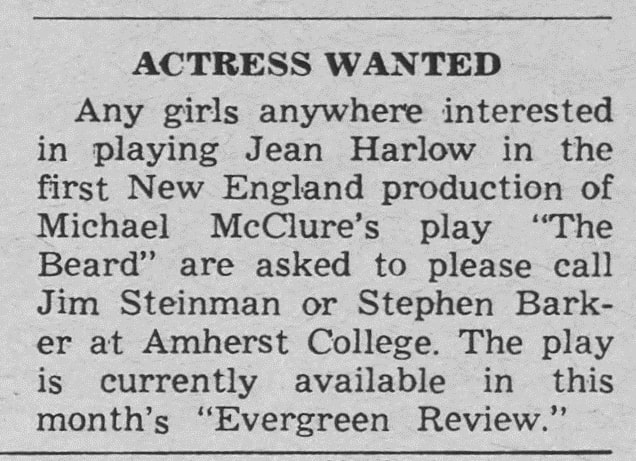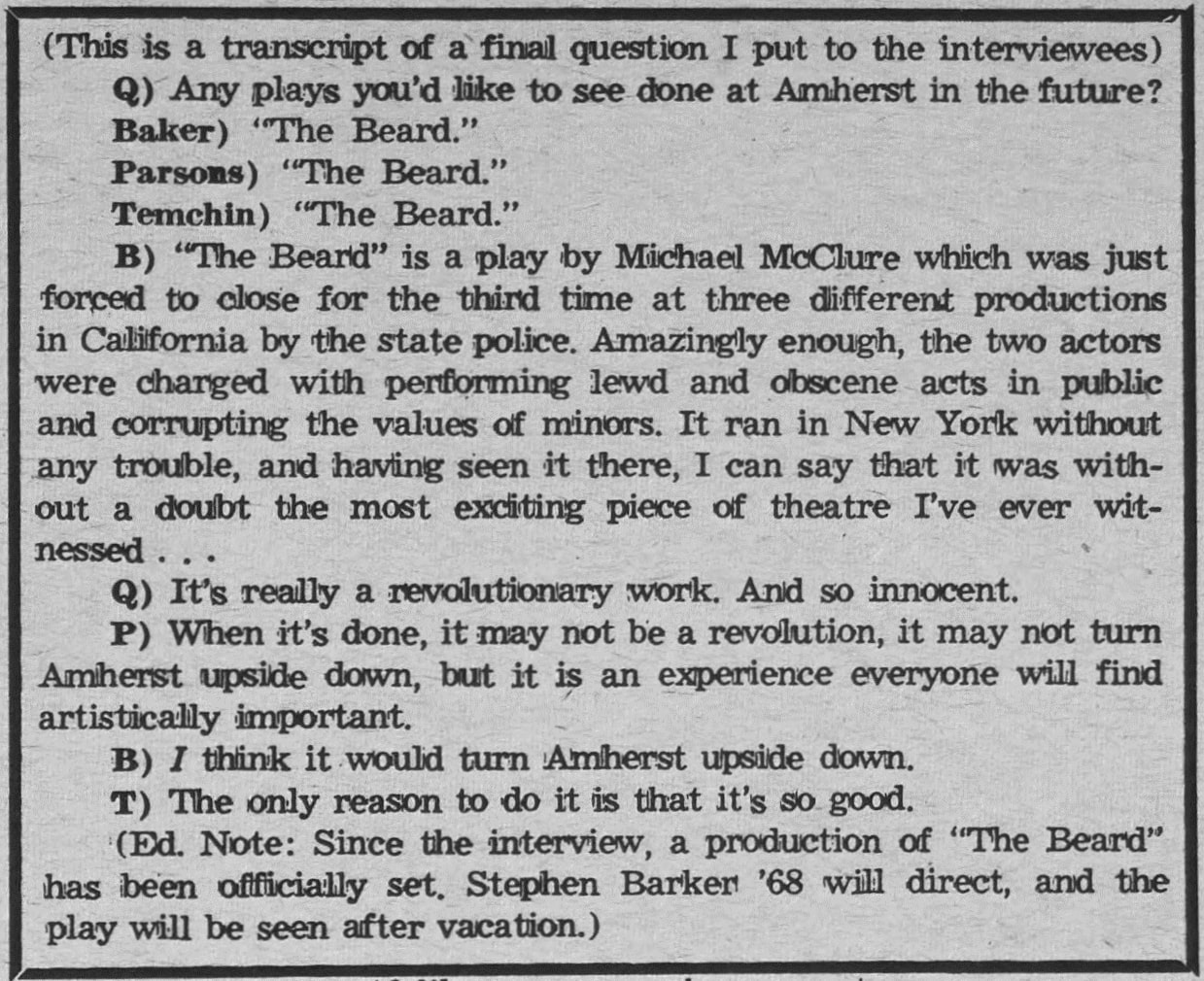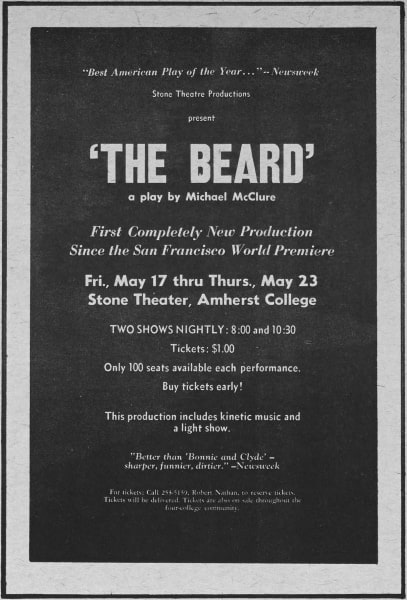A timeline...
Amherst Student

Source: Amherst Student archives

Source: Amherst Student archives

Source: Amherst Student archives
Plans are now being made at Stone Theater for a May production of Michael McClure's controversial play "The Beard" according to Steve Barker '68. Barker, who is waiting for the author's consent to his producing the play, explained that the controversy surrounding "The Beard" is centered on a scene in which the two principal characters, Jean Harlow and Billy the Kid, engage in oral sexual intercourse.
Recently, Los Angeles police called the play "obscene" and attempted to close is several times.
"The whole tone of the play is touchy, for McClure sets no limit on the language he utilizes in the script," Barker added.
President Plimpton's position on the production remains unclear. By his request, members of the Student Council are now reading the play, but Barker sees no reason for it.
He emphasized that he is not asking the Council for any money. Barker pointed out that to subject "The Beard" to Student Council approval would, in effect, be "asking for censorship."
‘Valuable Play’
Barker says he has had no contact with the President, nor does he see a need for any contact. " 'The Beard' ", says Barker, "is a good play and a valuable play."
James Steinman '69 will play the role of Billy the Kid and will also write the music for the production.
Open tryouts will be held for the part of Jean Harlow. Barker sees little difficulty in locating an experienced actress for the role and has already been contacted by several interested co-eds.
"The Beard" was first produced in San Francisco in 1967. On opening night the entire cast was arrested for "lewd and lascivious" conduct.
Source: Amherst Student archives
Some thoughts to straighten things out about "The Beard." It is a one-act play by poet Michael McClure. Its two characters are Billy the Kid and Jean Harlow. It takes place in "Blue Velvet Eternity." Its subject is the divinty of the human soul. It is probably the most important revolutionary American play of our times. Writers like Arthur Miller should be forced to see it a hundred times so that they might learn something about the possibility of theatre.
The play will be produced at Amherst this spring. Already people are worried and distressed. There is no question but that the play should be done at Kirby Theatre. It is doubtful that it will be allowed there.
Basic questions are involved, questions about whether a drama department has the right to ban a play that many have hailed as a masterpiece simply because they can only see it as smut, just because they worry about what the local fossilized townsfolk will say, despite the fact that students for whom a college theatre should be run, are eager and excited to produce the play as a vital experimental journey into a new form of theatre, just because things tend to settle down into a plush easy rut in a community like this. Art becomes capitalized and reupholstered, and you have to stay careful.
The fact is Kirby Theatre needs "The Beard" more than "The Beard" needs Kirby Theatre. In a transfusion it is the recipient that benefits, not the donor.
For McClure, a play is "a poem with meat on the stage with lights." "The Beard" is most definitely a poem. He goes on to say about the meaning of the play, a stupid but perhaps necessary question: "Wow … that makes me self-conscious. The play … it's about divinity. I mean, it says we're all divine … I think that's what puts everyone uptight about the play. It's not the sexuality that offends them, it's having to admit the universe is divine, they're divine, in spite of everything. They don't believe it, they're not ready to accept it, so the only thing they see is sex."
"The Beard" comes close to fulfilling Artaud's visionary prophecies of a ritualistic, dream-centered theatre, controlled by legend, mythology, fantasies, subconscious mad rivers. A theatre that is not primarily of ideas, plot, linear development, logical structure, intellectual substance: a gut theatre based on the need for primal ceremony to formalize our walled-up dreams. Plays that make trips through our back doors, then organize those trips into artistic form, plays that become "trophies" of those forbidden trips. Plays that fascinate, arouse, and perhaps obsess rather than edify or order, as most art does.

Billy the Kid and Harlow: American divinities. Embodiments of a country's fantasies, hopeful myths. Outlaws. Blues people. Hoodlum-saints, sainted by the people's need for sainthood, worshipped by their own body-light. Violence, sex, sweet dust of gun and white neck. Both characters are free; they are able to admit that they are alone, that they can do what they want, that they are mammals with animal electricity, that they are gods because they know they are mammals, that they are graceful and powerful enough to admit moment-by-moment that they are divine. And that admission brings eternity, and eternity brings complete liberty for the present. They are perfect American heroes: they represent in "The Beard" perhaps the purest nobility of this country. And finally, we're coming to realize it in our modern art. Read "Why Are We In Vietnam?" by Mailer, listen to the heroes of Dylan's songs, look again at "Bonnie and Clyde."
"They might have been Christ and Magdalene," McClure says, "Or Sakti and Shiva, or Ying and Yang, or Mars and Venus. There are a lot of divine characters." Billy the Kid and Harlow, not Jefferson and Paine, belong only to America.
Jesus : We're divine, baby, we're divine! This is it. We're really here!
Mary : You're crazier than fuck!
Jesus. Oh yeah! Come here and sit on my lap and lick my boots!
And what would Bishop Pike say to that ? Or Reverend Mudge ?
As for the ending. Why have Billy the Kid perform cunnilingus on Harlow? McClure's answer: "I didn't do it. Harlow and the Kid did it. It just happened." Beautiful.
And about the "obscene language." …I still find it amazing that we're allowed to say "napalm", "murder," "genocide," in public, even show these things on TV, but to show or say "fuck, cunt, shit, cock" or any other obviously religious items found in "The Beard" is considered less than human or artistic. Still, there is more to the language of "The Beard" than its inherent poetry. The phrases are repeated over and over and form a brilliantly constructed chant, a "mantra."
In essence, the word "FUCK" is a mantra. From Sanskrit: "man" is the first syllable of "manana" or "thinking." "Tra" is from "trana" or liberation from the phenomenal world. "Mantra" calls freethought forth. The barrier against "FUCK" makes a mantra of it. In effect, it becomes a "holy prayer." Shout FUCK, ritualize at, summon it forth as on a stage, and make all deep desired acts that are mortal and have perfect meaning to your life become ceremonial reality … FUCK can be an exclamation that clears the senses, an exorcism of beautiful demons. So much for language.
Some final thoughts: When Billy the Kid constantly orders Harlow to "Sit on my lap and play with my cock" it's like some mad Pope bestowing saint-hood. Now, isn't that a nice thought? Nothing dirty about that, surely.
One of the most poetic, haunting scenes : The Kid has bitten Harlow's toe and ripped her stocking. She removes the stocking and stands motionless on a "throne", or a huge fiberglass "hand," holding the nylon out in a posture too similar to the Statue of Liberty to be accidental, with emphasis on "liberty." The Kid turns the "hand" slowly, musing on the new reify he has brought forth in this woman: "one bare leg in a pale dress — you're holding an empty stocking — you blond hair is a crown — it's an emblem of eternity —, there's blood on your bare foot — your hair is mussed, there's anger in your eyes and you're aroused!"
The LA Times reviewer noted that "sex really is a bore unless you're a participant." Perhaps he'd rather watch Bonnie Parker and Clyde Barrow vomit blood.
Maybe the following dream I intend to have some day explains the whole thing best: We're all at Stonehenge, trying to paint jagged back pictures of ourselves on the air at night. We're licking the stones, listening to them tell us about our lives. A police car pulls up. President Plimpton comes over and asks us to stop. He scolds us: "Why don't you fellows learn to face life ? This is disgusting! You're all cowards! You're just escaping! Destroying yourselves! This isn't real!" And we look at him and whisper: "For the past hundreds of years, you and your friends have violently assassinated reality. At least give us the chance to practice euthanasia." Then we sacrifice him while motorcycles scream for joy, exploring the streets, tasting the confusion of freedom … so much for "The Beard."
Source: Amherst Student archives
Mr. Steinman:
I read your thoughts on "The Beard" in the STUDENT the other day, and I thought they were generally
very good, and sometimes illuminating. I have only read the Grove Press edition and haven't actually
seen the play performed, and although I may like the play ,a lot more once I do see it, most of the
things I have to say about your article probably cannot be changed by seeing the thing done in a
theatre.
Part of my problem with your article is really with what McClure is quoted as saying about his own play, to which must be added your own vague indifference to the fact that the characters in it are Jean Harlow and Billy the Kid, and not, for instance, Christ and Magdalene. Clure says "it (the play)nk When McClure says "it (the play) says we're all divine" and laden couples might have been then later says many legend-substituted — "There are a lot of divine characters" — a problem arises which you don't exactly address yourself to. You approach of in the end from making a it once or twice, but you back judgment which has at least some relevance to the play; that is, its sexuality. You might have said more about this. For the play doesn't seem to me to be only about our divinity.
Out of respect for your generation's parlance, I'll confine myself to saying that McClure's "Wow" and "I mean" and your "Beautiful" now sound somewhat more dated than "Gee whiz" even though I'm aware that the latter cliche is enjoying a revival.
Of more serious consequence in the realm of language, I would say, although you might not agree, that a stuffy Latinism like "cunnilingus" falls stillborn from your lips. Why not one of the more colorful vulgarisms in this context?
You also treat the word "fuck" in a pseudo-respectful way. It is true that you give it the emphatic dignity of capitalization, but otherwise you (and many, many others) seem determined to drag one of the 25 or so excellent expletives in the English language kicking and screaming out into the open. It has long since become a literary cliche, it is now firmly entrenched as an "underground(?) newspaper" cliche, it is fast becoming a theatrical cliche. All of this shows a lot of disrespect and thoughtlessness. I know all the worn arguments about dishonesty, religiosity, and factual animalism. As a good and thinking man, you should be worrying about the time when the word will not clear the senses, for the time is of course nigh. The pity is that the particular word "fuck" is such an absolutely perfect invention. And do you think it's easy for men to invent another? Not at all. It's very difficult! in my 46 years, the only new linguistic excellence I've run across in the sexual arena is the word "rim." You are young, I know, Mr. Steinman, but you're obviously intelligent to boot and probably old enough to realize that some words in English can be lost irrevocably.
I know you think I'm being harping. I'm not, and when I finish this letter, you'll know I'm not. But I have a few more things to say.
Some of your writing simply smacks of bad style, and bad journalism. When you say "obscene language" (your quote, not mine) whom are you quoting? How does one "show" napalm? Who considers "The Beard" (or the words used in it) "less than human or artistic"?
When you quote the reviewer from the Los Angeles Times, you are setting up an obvious straw man to knock down. Who, for God's sake, ever quotes the reviewer from the Los Angeles Times? Except you. Lastly, what is the point of showing a news-man asking an inane question and showing McClure giving his inane non-answer?
Having said all this, Mr. Steinman, I must say also that I appreciated your article. It was far superior to most of the things in the STUDENT and I certainly hope that "The Beard" will get a good reception at Amherst; if not at Kirby, then wherever else it will be performed.
Sincerely,
Paul Leahy
'44 Boston.
Source: Amherst Student archives

…
"The Beard" (by Michael McClure will be seen from May 17-May 23, two shows nightly, 8:00 and 10:30. The play, "a poem with meat and lights," will include perimental musical collages and a light show by Dan Conrad '68. Stephen Barker and Susan Richardson portray Billy the Kid and Jean Harlow. Jim Steinman directed. Tickets are $1 and should be bought early. Newsweek called "The Beard" the "Best American play of the year."
Source: Amherst Student archives
"The Beard," by Michael McClure, seems to me an exercise in staging and theatrics. It contains Billy the Kid and Jean Harlow, sitting in adjacent chairs and looking out on the plain of eternity, and its conclusion (as everyone must know by now) is the only cunnilingus in legitimate theater.
At the Los Angeles performance of "The Beard," police moved in and arrested the actors for obscenity — besides its final scene, the play is fairly free with the words "cunt," "fuck," "shit," and "cock" — and the barrage of advance publicity for the Amherst production gave me the impression that was why we were to see it. Pornography, the new Art Form.
Well, its "obscenity" is a good deal tamer than run-of-the-mill Amherst dorm conversation-sodomy, now, that's gross, but cunnilingus? A household word. The point is that "The Beard" is not to be revered, as I think we were meant to revere it, for its sexuality.
On the other hand, the lines can be given an enormous amount of force and power, and the sense of the play is as serious as, say, the sense of "Bonnie and Clyde" (another story of American anti-heroes). If it is pornography, it is legitimate pornography, and there is no reason on earth not to perform it.
The Amherst production of "The Beard" — given 12 performances in Stone Theater the week of May 17 and directed by James Steinman '69, with Stephen Barker '68 as Billy the Kid and Susan Richardson (Mt. Holyoke '69) as Harlow — just about realized, I think, the play's potential. Steinman had some stunning ideas (the least stunning of which was performing the play in the first place) : an extended "overture," with light by Dan Conrad '68 and sound by Steinman, was so overwhelming and hypnotic that the play itself was almost a letdown; the gauzy set (by Barker) and the blue lighting did suggest eternity; and the pace of the dialogue made the play considerably less boring than it might otherwise have been. Both Barker and Miss Richardson, moreover, seemed perfectly cast — a couple of girls in the audience moaned audibly when he first appeared (very impressive effect, although their dates may have been a bit put out); both moved well; and neither slipped out of character for a second.
Although I don't care if I ever see it again, I hope people continue to be as excited about theater here as they were about "The Beard." Next time, maybe, for the right reasons. Hopeful signs are in the air.
Source: Amherst Student archives